Quiet Morning, Familiar Routine
Just like every morning, I shuffled into the kitchen in my faded pink robe and those fuzzy slippers Ron bought me our second Christmas in this house. The light through the window landed softly on the old linoleum. Twenty years of mornings, and I still savored this ritual: the gurgle of the coffee maker, the gentle hum of the fridge, the clink of the spoon against Ron’s favorite mug. Even after he passed, sticking to the routine brought comfort—a kind of wordless conversation with everything we’d built together. The stillness was a balm against the world’s noise. I’d pour my cup, carefully measured cream swirling like a little galaxy, and take out my paperback mystery novel, intent on claiming that first hour of the day just for me. My mornings had always been sacred—a gently quiet intermission before the busy world crowded back in.
That day, as I stepped onto the back porch cradling my mug, the silence felt comforting, expectant. The roses we planted around the gazebo were only nubs of green, not yet ready to show off their blooms, but the promise was there. I ran my fingers along the railing, a private gesture of greeting. My home was my sanctuary, my hard-earned place of rest—and, or so I thought, under my protection. I would soon learn how quickly, and thoroughly, that peace could be upended.

Coffee Aromas Fill the Kitchen
The scent of my favorite dark roast filled the house, making the old wood cabinets and fridge magnets feel almost animated by memory. I opened the window above the sink, letting in the crisp hint of dawn. The little table near the back door was set with a plate for toast, my book propped up against the creamer, the crossword started but unfinished. My mornings had a rhythm—a steadiness I anchored myself to, especially since Ron’s passing.
I knew all the subtle sounds of this house—the clatter of pipes, the click of the old heating system, the creak of floorboards as I walked back and forth. As I prepared my breakfast, I caught sight of Ron’s garden gloves, still tucked on the counter near the back door, a gentle reminder of all the mornings we spent together pulling weeds and whispering plans for the day.
It was the little things that gave me a sense of home: the slightly uneven window sill where I lined up my spices, the mug with ‘World’s Best Grandpa’ written in fading paint, the way the sun hit the kitchen floor at the exact angle Ron always said made the whole room look golden. For a few minutes, I let myself believe that nothing—absolutely nothing—could ever change this peace. I didn’t realize how temporary that illusion really was.
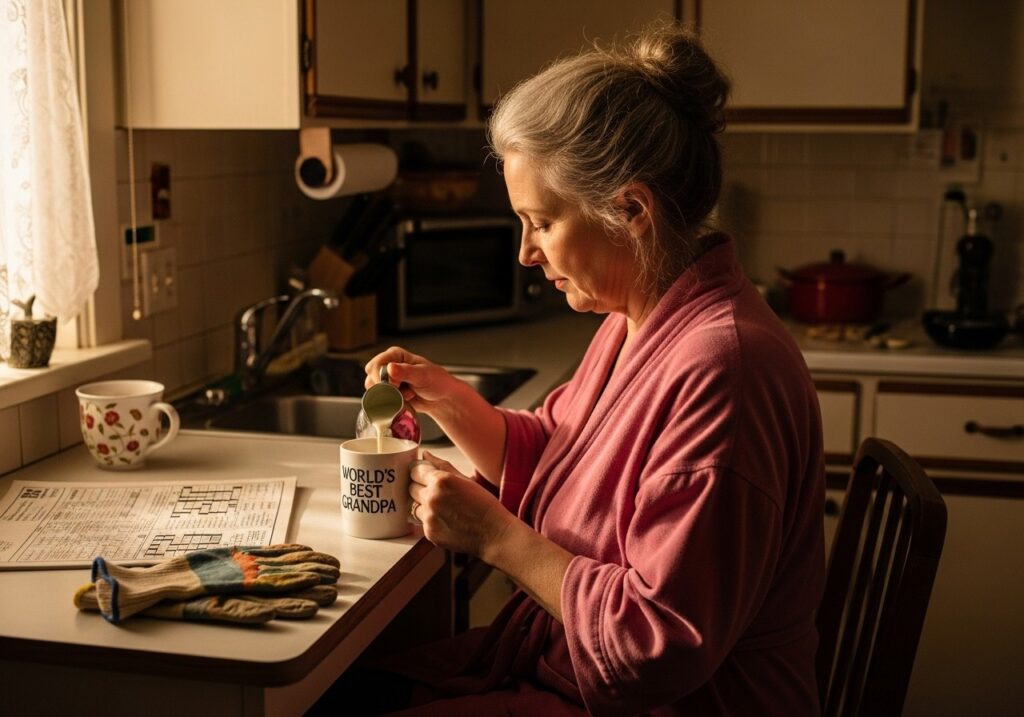
A House No Longer My Own
It happened so subtly, I almost didn’t notice the shift. When my sister called, her voice heavy with stress, I remembered how often family had been my refuge—how, over the years, my house had always been a gathering place for laughter and support. “Just a few weeks,” she’d promised. Her two kids trailed in behind her—one silent, earbuds in, the other trailing socks and schoolbooks through every hallway. I set up fresh towels in the guest room, cleared a shelf in the fridge, even baked banana bread so everyone would feel welcome.
At first, it felt good to be useful again, to have bustling energy in the house. But days blurred into weeks. Slippers disappeared and were replaced by sneakers on the stairs. My kitchen counter, once neat and predictable, grew crowded with unfamiliar snack wrappers, half-empty sippy cups, and baskets of laundry that always seemed to multiply by morning.
Gradually my solitude—the simple rhythm I’d cherished—was swallowed up. Doors slammed at midnight. The TV droned through the walls. The bathroom was never empty when I needed it, and my sacred morning hour was bookended by squabbling, cereal poured directly onto the table, and a cartoon carousel that never stopped spinning.
It snuck up on me, the way the familiar can slowly be edged out by small, insistent changes you never agreed to. I looked around one afternoon and realized: this house, once my safe harbor, now felt like a bus terminal—a place of constant motion and noise, where I was suddenly an outsider.
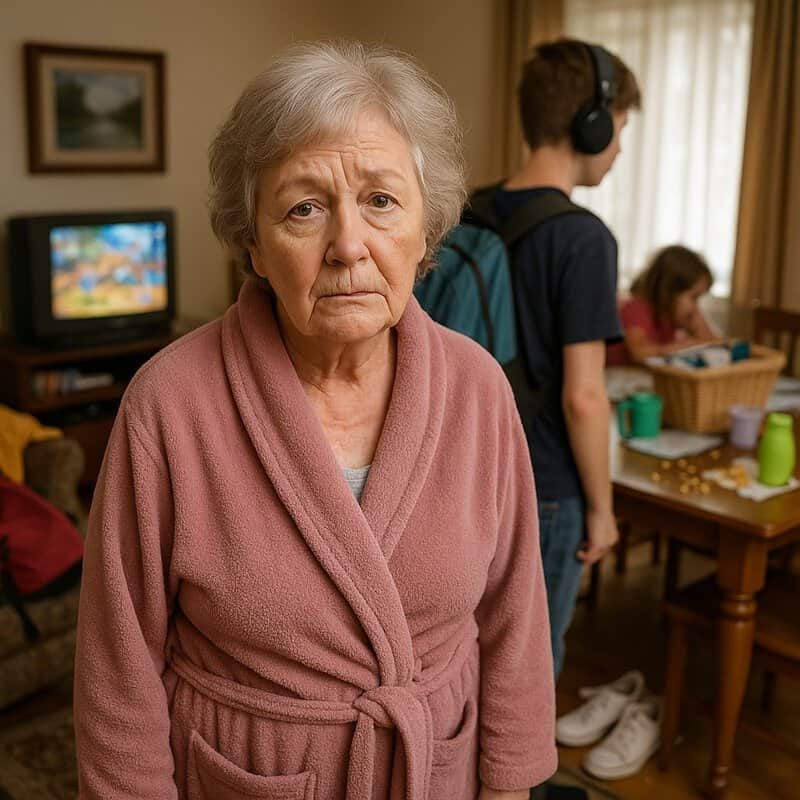
The Guests Who Never Left
The weeks stretched longer and longer, each day chipping away at the boundaries I used to take for granted—and as that happened, my patience wore dangerously thin. My sister always swore they’d be gone “soon, just a little longer,” but soon became a moving target. Her things invaded every room: jackets on the banister, shopping bags on the dining chairs, even a yoga mat rolled out in the hallway.
The kids treated the house like their own private playground. Shoes piled at the doorway, video game consoles knotted in cords across the living room, empty juice boxes wedged in the sofa. Arguments about chores, about screen time, about whose turn it was for the shower or what to watch at dinner volume—these became the new soundtrack to my evenings.
What was “temporary” blurred into normal. Unasked, my sister moved my things, reset the family photos, and rearranged the pantry. The kids laughed at rules I’d had for years—no feet on the couch, no food in the bedrooms, quiet after 10 PM—and no one thought to ask if I minded. Strangers might have tiptoed around, but family, it seemed, had permission to let the boundaries fade.
I tried to make peace with it. After all, hadn’t I always been the one who helped? The one who made room, put on the kettle, set extra places at the table? But with every change, every trespass, my home felt less like home. I was beginning to suspect that “just a few weeks” would never really end—at least, not unless I made it end.

Rules Ignored, Boundaries Crossed
I’ve always prided myself on keeping my house in order. Ron and I had simple rules—a kind of gentle structure that once felt like a comfort, never a cage. No eating in the living room. Shoes off at the door. Dishes rinsed after every meal. These weren’t just routines; they were the quiet agreements that kept peace and respect alive in a shared space.
Within days, those rules evaporated. I’d find muddy sneakers abandoned in the hall, a trail of jelly-smeared fingerprints leading from the fridge all the way to the TV remote. My stern reminders were either met with blank stares or casual shrugs—sometimes my sister offered a distracted “Sorry, Mom’s tired,” as if that excused everything.
The worst was the way boundaries blurred without permission. I came home one afternoon to find teenagers stretched out on my freshly made bed, eating chips and scrolling through my old photo albums with greasy fingers. I’d enter the kitchen in the evening only to discover all the pans used and nothing cleaned up, a half-burnt smell in the air, and the dinner I’d planned shoved to the back of the fridge to make room for yet another hastily grabbed takeout container.
It went beyond clutter and noise. It was the gradual erasure of respect for the space I’d worked so hard to create. With every ignored rule, every boundary crossed, a part of me shrank back, wondering if there was any way to get my home—and my authority—back.
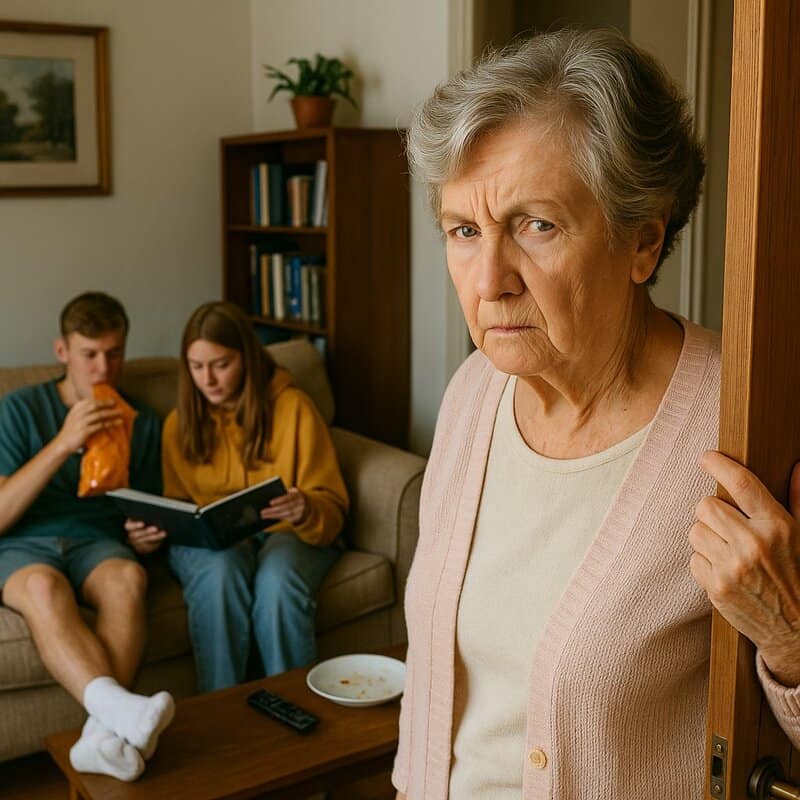
My Sanctuary Disrespected
Sanctuary used to be the word I whispered to myself when the world felt too loud, the refuge where every knickknack and pillow had its place and meaning. My living room was where Ron and I once solved crossword puzzles, my den filled with quiet meditations and letters from friends. But slowly, sanctity faded into chaos.
Every seat in the house suddenly belonged to someone else: jackets slung over my favorite armchair, crumbs in the recliner where Ron watched football, my book abandoned—spine cracked—on the floor beneath a pile of discarded socks. The kids sprawled across the couch ignoring my gentle hints, my sister watched TV with the volume up so high I could hear every laugh track from the other end of the hall.
Windows were left open regardless of weather; doors were banged, not closed. I’d return to find my ‘do not disturb’ sign ignored, a cousin’s overnight bag dumped in my reading nook, my knitting basket upended and tangled with game cords. Even the bathroom—once my little retreat, where I could soak and breathe and think—now hosted damp towels, empty shampoo bottles, and toothpaste streaked in zigzags all over the sink.
I tried to stay calm, reminding myself that family was a blessing even as they trampled over every part of the life I’d carved out for myself. But little by little, my sanctuary was stolen, replaced by a steady current of chaos and disrespect that I never invited but felt powerless to stop.

“Just a Few Weeks” Turns Into Months
Whenever I’d find a moment alone—usually late at night, staring at the dish-stacked kitchen sink—I’d replay my sister’s promise in my mind. “Just a few weeks, Amanda. We’ll be out of your hair in no time.” She said it with the easy confidence of someone who counted on me to always say yes. But what happens when a few weeks slip unnoticed into two, three, four months? By the time June passed, her suitcases had become permanent furniture, her work papers covered the dining table, and the kids started marking their heights against the hallway doorframe, as if staking claim.
Early on, I’d gently ask, “Any news on your new place?” My questions were met with hopeful deflection—maybe next week, maybe after the holidays, maybe when her job11. Piles of Laundry Multiply
The first time I stumbled over a pile of pink unicorn pajamas on my way to the bathroom, I simply sighed and tossed them onto the growing heap forming outside the guest room. But by the end of that second week, every hallway became an obstacle course of balled-up socks, toweling off after showers, and my nephew’s basketball shorts reeking of grass stains. I hadn’t seen my own laundry basket in days, shoved behind a mountain of t-shirts whose owners showed no concern for where their things landed. The living room became a secondary sorting station, with half-folded laundry on the armchairs and someone’s sports bra draped over my reading lamp. I tried to keep order at first—offering to do a communal wash, even drawing up a simple laundry schedule—but nobody remembered whose turn it was or cared when their damp shirts went missing. My washing machine, which had never run more than twice a week, now gurgled endlessly, sometimes three loads a day, always accompanied by the thump-thump of sneakers left inside “by accident.” It soon became easier for my sister’s kids to rifle for clean socks in communal piles than to actually put anything away.
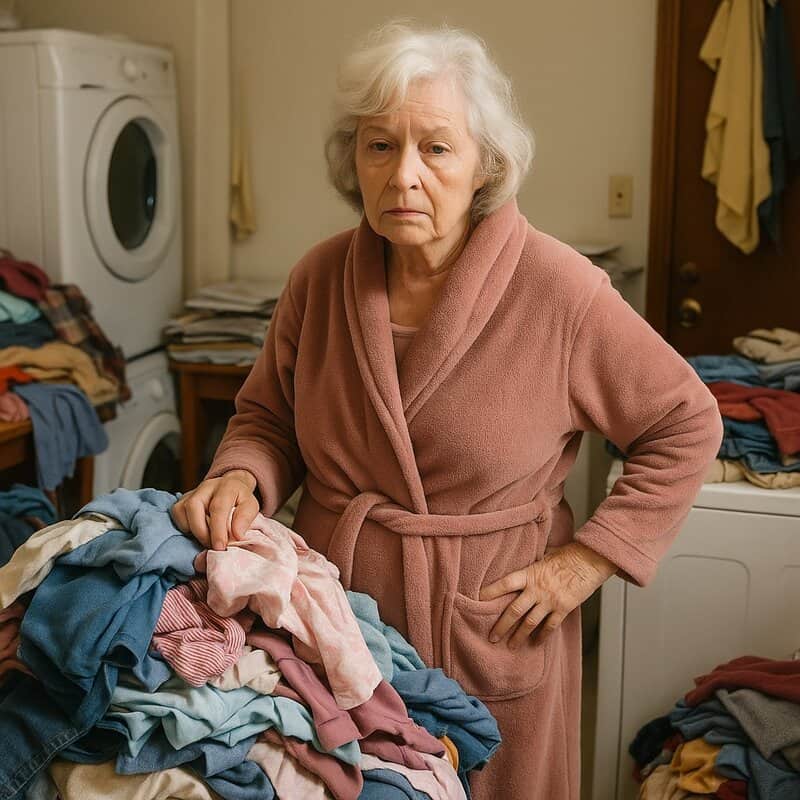
Sleepless Nights, Endless Noise
The quiet that used to greet me at bedtime vanished overnight. At first, I welcomed the background hum of family—a giggle here, a muffled conversation through the walls. But I quickly realized this was only the beginning. By nine, a dull roar emanated from the living room where the kids played some shrieking video game, every defeat punctuated with the sharp bang of a controller hitting the floor. My sister, who swore her kids needed firm “electronics off” rules, soon gave up. Instead, she joined them for one more episode of some reality bake-off, the sounds of enthusiastic clapping and competitive yelling swelling just as I wished for sleep. Even in the sanctuary of my bedroom, there was no relief: doors banging, footsteps racing down the hall to the bathroom, my niece’s phone ringing at midnight with animated FaceTimes. The very walls rattled—one night I awoke to the unmistakable sound of a dance-off above my head, my ceiling fixtures trembling in time to teenage pop. It didn’t matter if I asked for quiet; by morning I’d counted the minutes between each interruption, dreading the alarm and the parade of weary faces complaining about how “hard it is to fall asleep in a new place.”

Family Feasts Without Me
In the beginning, I loved the idea of family dinners in my kitchen—the clatter of dishes, shared laughs, the scent of garlic bread wafting through the house. But that faded as dinner became a nightly takeover. My sister laid claim to the stove, shooing me away with a cheerful, “Go relax! We’ve got this tonight.” I believed her the first few times, grateful for a break from the cooking. But then, somehow, dinner started without me at all—my oven occupied by greasy pans I never bought, the dining table crowded with loud chatter before I’d even been called. My own mug and dishes disappeared into an endless sink pile, replaced with plastic cups I never kept in the house. Once, returning late from a walk, I stood in the hallway, listening to the riotous laughter through the kitchen door. Someone was recounting an inside joke—one I hadn’t been there to witness. By the time I entered, the feast was nearly over, casserole dishes picked clean, a single crust of bread left as “your share, Aunt Amanda.” I made myself some toast and sat at the far end of the table while everyone else carried on as if I were invisible, my own home suddenly less familiar than a hotel lobby.
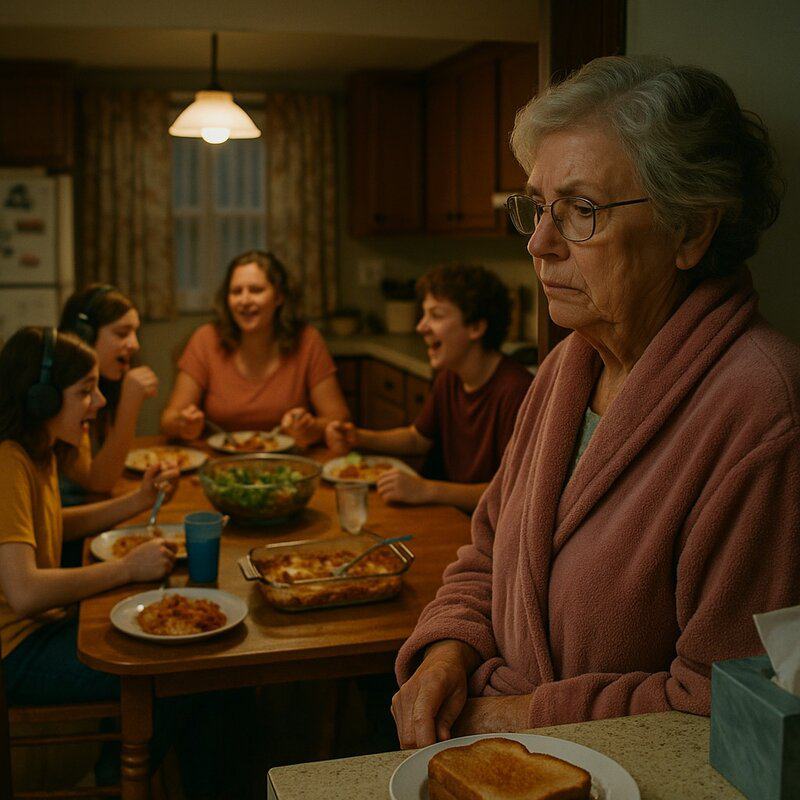
Polite Requests, Dismissed or Mocked
Politeness became my shield in those early days—a gentle reminder to pick up shoes by the door, a soft “Could you please put your towels in the hamper?” The kids never seemed to hear me, and my sister’s response was always the same: a distracted “Sure thing, Amanda,” followed by no action at all. I tried reminding them not to wear muddy sneakers in the house, only to come home to fresh footprints streaking across the carpet, laughter echoing from upstairs. The first time I asked them to keep their music down after 10, my niece rolled her eyes, whispering to her brother just loud enough for me to hear, “She’s so old-fashioned, right?” I caught my sister smirking when her youngest waved a dripping popsicle over the sofa. “It’ll come out in the wash,” she said cheerfully, as I wiped up the sticky trail. My frustration grew each time a request dissolved into silence or, worse, outright mockery. I started to dread opening my mouth, knowing my words would be ignored, twisted, or greeted with that entitled giggle that told me my authority meant nothing here. Each plea for respect ricocheted off the walls, leaving me with nothing but the echo.

Cleaning Up Their Chaos
I found myself back in the role I’d tried to retire from long ago: the invisible, indispensable caretaker. My mornings began with a ritual march through every room, garbage bag in one hand, spray bottle in the other. The family tornado swept through daily, leaving in its wake a constellation of chip crumbs, streaks of jam, school papers, and plastic wrappers tucked into couch cushions. I vacuumed up the trail of cereal from the hallway, only to find rainbow sprinkles embedded in the rug by the afternoon. The kitchen counters, once zones of order and calm, became sticky with spilled juice and crusted over with the ghosts of yesterday’s dinners. Every surface begged for attention. I set up a chore chart on the fridge, color-coded and hopeful. No one noticed, and every box beneath their names remained glaringly empty by week’s end. I washed forgotten dishes, folded towers of laundry that never made it into drawers, and scrubbed what felt like thousands of fingerprints from newly painted walls. My own mess was always small—a mug, a saucer, a newspaper—but theirs grew like ivy, quick and invasive, climbing into spaces meant to be mine. The hardest part wasn’t the physical labor—it was the glaring sense that nobody, not even my sister, saw what I did, or cared that my sanctuary was slipping away under the weight of their chaos.

Locked Out of My Own Bedroom
One night, exhausted and desperate for peace, I trudged down the hallway only to find the door to my bedroom locked. For a surreal second, I thought I’d made a mistake—maybe I’d wandered into someone else’s hallway. But no, it was my familiar brass handle, my floral wreath on the outside. Voices floated through the door—my niece giggling with her cousins, the TV flickering, the unmistakable thump of feet bouncing on my mattress. I knocked timidly at first, then louder, my patience unraveling. The door swung open. “Oh, sorry, Aunt Amanda! We just needed a bigger space for our fort,” my niece chirped, not the slightest hint of apology in her voice. Slippers kicked aside, their pajamas and half a bag of popcorn spilled across my duvet. I wanted to yell, to claim my space, but exhaustion won. Instead, I stood by as they shuffled out, not bothering to clean up. Pillows askew, crumbs on my sheets—a reminder that even the last sanctuary I thought was mine was now just a part of their playground. That night, I slept with the door firmly locked behind me, but even then, I didn’t feel at home.
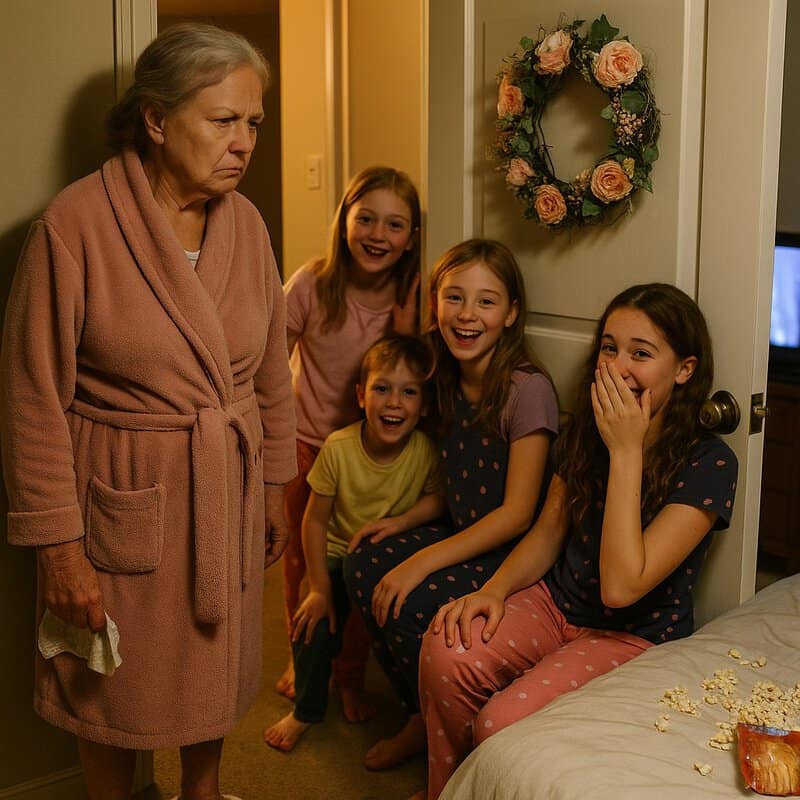
Lost in the Crowds—In My Home
With every week that passed, my house became more crowded, my own presence fading into the background like a ghost. I’d catch glimpses of myself in the hallway mirror—the only one not laughing, not shouting over music, not running around with snacks and school projects. I’d move from room to room on autopilot, tiptoeing around shoes abandoned mid-hallway, pausing at doorways before turning away, unsure if I’d be welcome or merely in the way. The living room, once my reading nook, filled with kids sprawled across every possible surface, friends visiting unannounced, adults on the phone in languages I barely understood. Even the kitchen—my kingdom—bustled with unfamiliar routines and conversations that didn’t pause when I entered. It was as if I had turned invisible, a wisp of old wallpaper between all their lives. I became adept at sidestepping messes, slipping into the corners of my house where my energy, my essence, seemed to be withering. I realized that home was no longer measured in square footage or painted trim—it was measured in whether you belonged in your own chair. At that point, I couldn’t honestly say that I did.
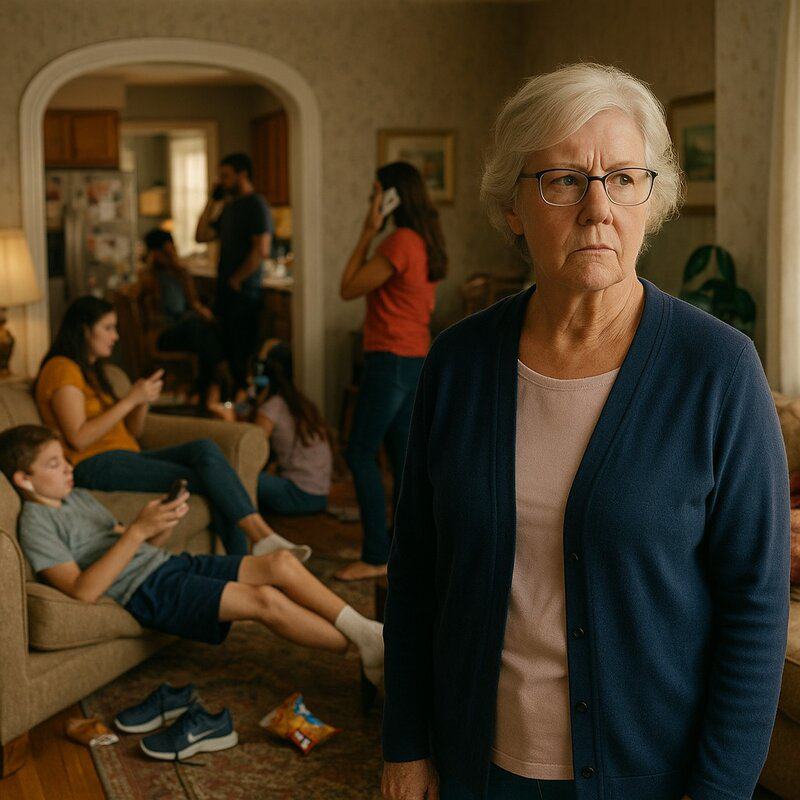
Whispered Phone Calls: “How Much Longer?”
I started making whispered phone calls late at night, huddled in the laundry room with the dryer as my only company. My dearest friend, Margaret, was the first person I called. “How much longer do you think they’ll stay?” I whispered, voice tight with frustration and defeat. She clucked her tongue sympathetically, confessing that she’d noticed the stress in my voice for weeks. “You have to set boundaries,” she urged. Easier said than done when guilt and family history pressed down on me like a weighted blanket. Some nights, I would call my nephew Kevin for advice, the one who helps me with anything digital. He told me to send a group text and lay down some rules. I’d hang up without doing so, unable to imagine the fallout. Still, I kept asking, “How much longer?” as if repeating it enough would make time speed up, would propel my sister’s family out the door before their roots strangled my own comfort
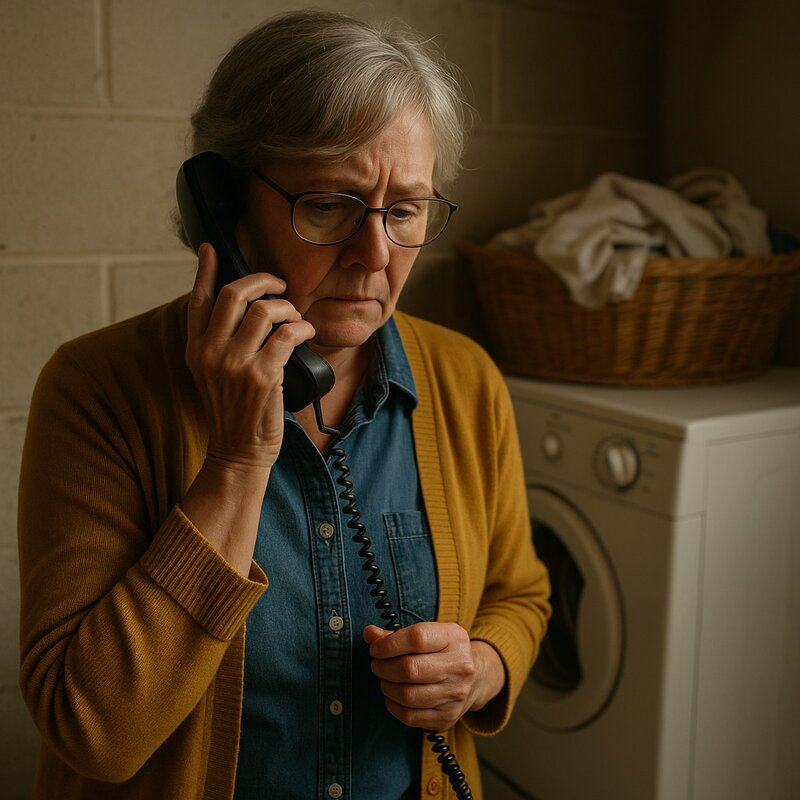
“Your Rules Are Too Strict”
It didn’t take long before my rules—basic things like “no shoes on the furniture” and “quiet after ten”—became a punchline. My niece started calling our house “The Library,” sneaking in theatrical shushes whenever her brother so much as sneezed. One afternoon, when I reminded them to put their bikes away before it rained, my sister laughed and told me I worried too much. “Loosen up,” she said, plopping onto the arm of my favorite chair with muddy shoes still on. I overheard her kids later, whispering in the hallway. “She makes too many rules,” said the little one, her tone conspiratorial. “Mom said it’s because she doesn’t have real kids, so she doesn’t get it.” Every request was met with groans, dramatic sighs, or thinly veiled sarcasm—”Ooh, we’d better not touch the coasters, or Aunt Amanda will faint!” My boundaries, once the gentle structure that made my house peaceful, became the battleground for every eye roll and whispered complaint. Each criticism chipped away at the myth that this was still my home, and left me questioning: was kindness really worth it if it meant being treated like an unreasonable stranger in my own living room?

Kids’ Mess Spreads Room to Room
At first, I tried to contain the chaos by assigning each child a basket for their things, hopeful that a little structure would help. But that effort was quickly buried beneath the tidal wave of toys, wrappers, school projects, and clothes that migrated steadily from bedroom, to hallway, to every single room. I found lollipop sticks in my bathroom drawers, crayon marks on the wall outside my office, and sticky handprints inches from my prized walnut hutch. Even spaces I once considered sacred—like the nook beside my armchair where I kept Ron’s old police badge—became clogged with half-eaten snacks and someone’s missing math homework. No matter how many times I gathered up the clutter or returned rogue sneakers to their owners, the mess seemed to multiply overnight. My home transformed from a cozy haven into something between a play area and a storage facility, where nothing stayed where I’d left it and no surface was safe from invasion. The worst part? Nobody else seemed to care. I’d watch them step over tangled heaps of their own belongings, oblivious, as if the mess just sprouted from the floorboards, as perennial as the climbing roses outside.
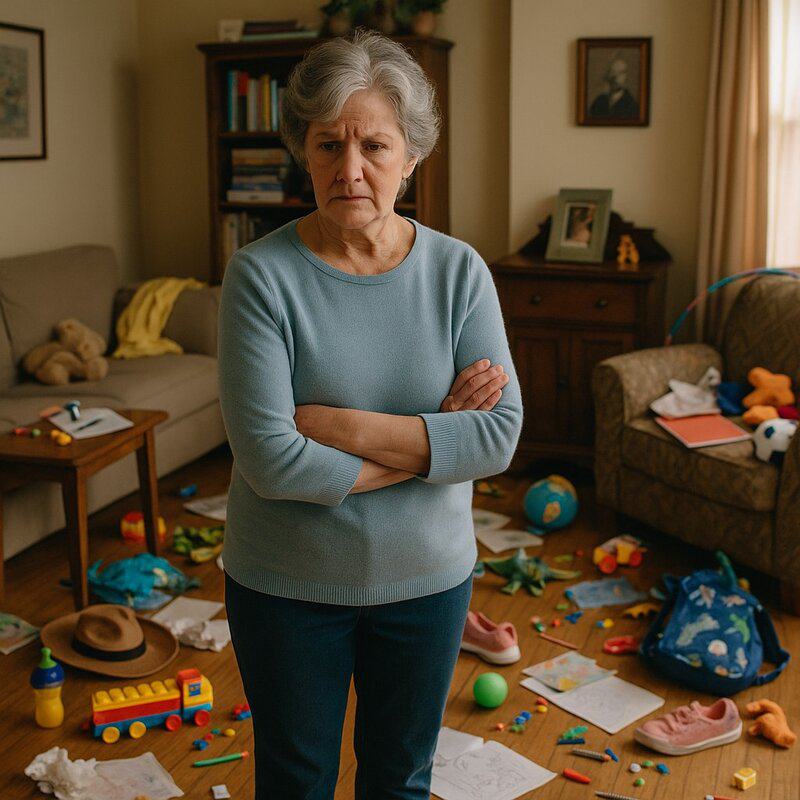
Sister’s Promises—Empty and Forgotten
Whenever my patience would snap and I confronted my sister, she was always apologetic, always “so grateful,” always quick to promise change. “We’ll talk to the kids. This week, we’ll start putting things away. I’ll handle dinner cleanup tonight, okay?” Her voice was soothing, reassuring—she meant well, I truly believe that. But the next day nothing changed—not even a little. The kids groaned at reminders; the mess lingered on counters and couches; I still found myself up late, scraping dried cheese from pans I never used. My sister’s promises became their own background noise—just another sound in the chaos, as easy to tune out as the squealing from a video game or the slamming of doors. Sometimes I’d confront her again, voice shaky with exhaustion. She’d hug me, apologize, and tell me that family was “a little messy, but we’re worth it.” I started to feel like the only adult in a house full of children, including, in some ways, my own sister. Her reassurances made me feel ungrateful for wishing that she’d just follow through, just once, and help me reclaim the comfort and order I missed so much.

My Patience Wears Thin
By now, even the smallest infractions felt monumental. One morning I found a trail of sticky jam fingerprints winding from the kitchen into the front foyer. I nearly wept—not because of the mess itself, but because I knew nobody would see it but me, and nobody but me would think to clean it up. Every ignored request or broken promise pooled into a simmering resentment that followed me from room to room. I couldn’t remember the last time I’d read more than a paragraph of my novel without interruption, or finished a cup of coffee before it went cold. The joy I’d felt at having family under my roof had transformed into a heaviness I could not shake. Even my dreams became restless—an endless loop of tidying up after people who didn’t care. I bit my tongue so often it almost became instinct; voicing my irritation only led to sighs or, at best, a touchy apology that didn’t reach beyond that moment. It was dawning on me that the stricter I tried to be, the more they ignored me. My patience—once my greatest point of pride—felt stretched impossibly thin, like an old bedsheet at risk of tearing any day.

Family Meeting That Goes Nowhere
One dreary Sunday—rain streaking the windows, the kids already bickering over the remote—I called a family meeting, determined to reclaim a shred of authority. I made a pot of tea, set out a plate of cookies (my olive branch), and asked everyone to gather in the living room. My voice trembled as I explained how overwhelmed I felt, how much I missed my routines, how I needed everyone to respect a few basic house rules. My sister nodded along, her expression tight with exhaustion, but before I even finished, the kids started negotiating exceptions—”But I have to leave my shoes by the heat vent or they’ll be cold!”—and asking how soon they could go back to their show. My sister promised, once again, that things would be better, but the kids rolled their eyes and scattered before I could even hand out my printed list of chores. I sat there, cookies untouched, tea cooling beside me, as the hum of electronics started up again in the background. The only indication my words had landed at all was the faint whiff of irritation I caught in my sister’s sigh as she left the room. Any hope I had for meaningful change withered, replaced by the sinking knowledge that nothing would happen unless I forced it.
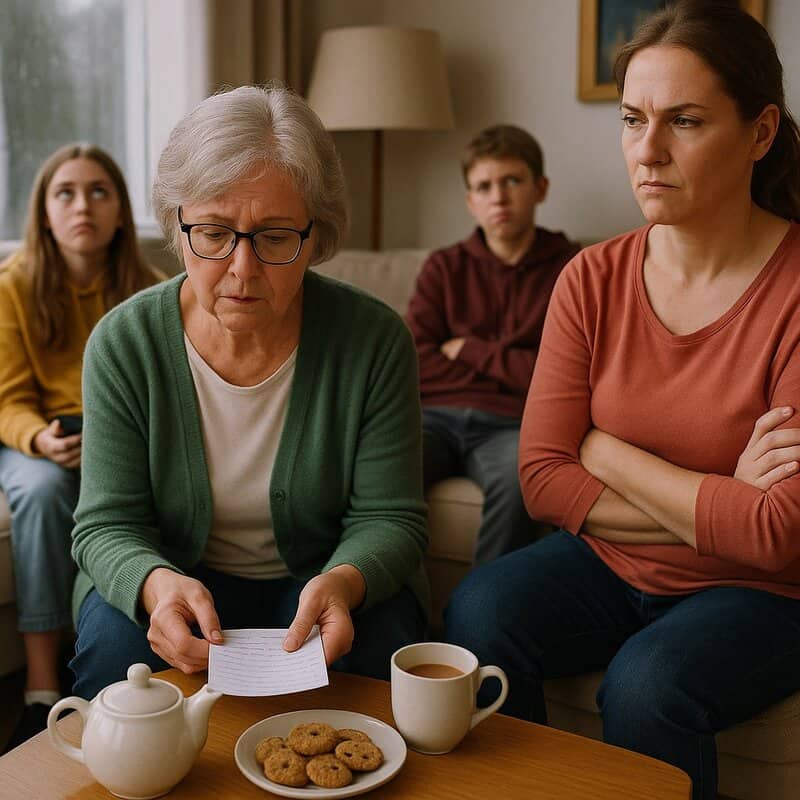
My Sacred Mug Gone Missing
It was a morning that could have been uneventful—the kind I used to treasure, with birdsong and fresh coffee, before my world became a circus. But as soon as I shuffled into the kitchen, still in my robe, I sensed something was off. My favorite coffee mug—the one Ron gifted me for our thirtieth anniversary, hand-painted with forget-me-nots—wasn’t hanging on the rack, wasn’t stacked haphazardly with the mismatched novelties in the cabinet. I scanned the counters, the sink already overflowing with someone else’s neon cereal bowls and chipped mugs that weren’t mine. My heart started beating faster; it was just a mug, I told myself. But it was never just a mug. I poked through piles of dishes, lifted a dirty dish towel, checked the living room end table. Nothing. Only when I noticed a sticky chocolate fingerprint on the handle of the kids’ lunchbox did I realize the truth. I found my mug abandoned under the couch, filled with a melted mess of hot chocolate and marshmallows, forgotten and chipped. The sight—the sheer disregard for something so irreplaceable—hit me like a physical blow. I stood there for a long moment, staring at the mug and thinking: I am invisible in my own home.

Chaos in the Kitchen
The kitchen had always been my command center—tidy, humming, fragrant with coffee and Ron’s favorite cinnamon rolls on Sunday mornings. But that morning, as I surveyed the wreckage, it felt more like a disaster zone than a sanctuary. Counters littered with unidentifiable crumbs, juice cartons leaking sticky trails down the side of my once-spotless refrigerator. Someone’s half-constructed sandwich lay abandoned beside a pile of dirty knives, the bread already curling at the edges. The floors, which I used to polish every Wednesday, now crunched underfoot with cereal, sand, and something suspiciously gritty. Wrappers, mugs, Tupperware lids, someone’s homework scribbles—all tumbled together in a debris field that stretched from the sink to the back door. I started to clean up, but every motion felt futile; five minutes later, a new wave of mess would take its place. What’s worse, nobody seemed to notice—or care. My sister drifted in, rummaged noisily for her travel mug, and left the cupboard door wide open behind her. The kids yelled about waffles, dropped syrup packets on the floor, and vanished. In that moment, the kitchen I’d built with Ron became unrecognizable, a space I no longer wanted to claim as my own.

What I Found on the Counter
I was already frazzled—resentment thrumming in my temples, mug clutched tightly—when I went to make a simple piece of toast. That’s when I saw it on the counter: a crumpled wad of cash, a handwritten “IOU” from my niece for “taking $5 for Starbucks run,” and an empty pill bottle that definitely wasn’t mine. I stood there for a second, trying to process. I’d told my sister, so many times, to keep her things organized, to keep medicine out of reach, to teach the kids about boundaries and respect. But there it was: my counter, a dumping ground for their debris and bad habits. And in that mess, I realized what truly haunted me: my own boundaries had been tossed aside as thoughtlessly as that empty bottle or the half-eaten apple rolling dangerously close to Ron’s favorite cookbooks. I cleaned up in silence, stacking the coins, tossing the trash, slipping the note under the silverware drawer for later confrontation. The air felt heavier—like the mess had seeped not just into my kitchen, but into every last corner of my patience.
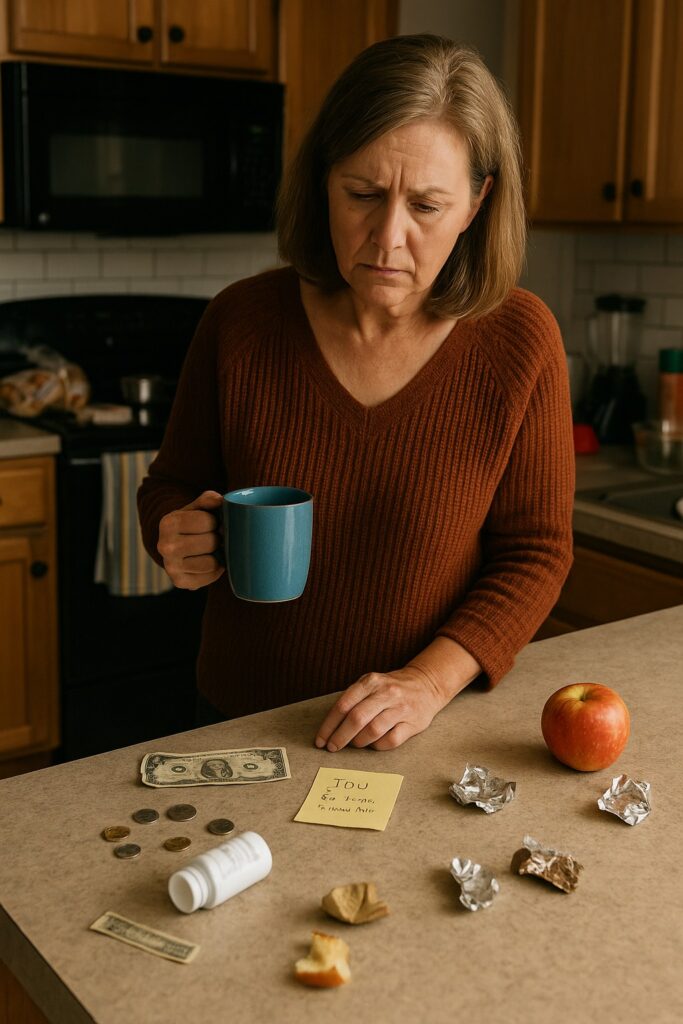
Sticky Floors, Dirty Dishes
I forced myself to keep cleaning, even as my anger simmered just out of reach. The floor stuck to my slippers with every step—syrup here, gummy bear there. Each plate I rinsed bore another story of disregard: spaghetti welded into a crust, glasses etched with fingerprints and milk scum, utensils missing entirely. I opened the dishwasher, hopeful, but it was loaded with someone’s shoes (dirty shoes!), the racks warped by weight. Utter disbelief mixed with a desperate urge to laugh; it was so absurd, so outside the realm of what I’d once thought possible, that for a moment I just stared at the chaos. I heard the kids shriek somewhere down the hallway, my sister shouting for someone to come pick up a soccer ball from the stairwell. And the kitchen—once my haven, my pride—had become ground zero for a family’s campaign of careless living. There was nothing left, it seemed, but to breathe deeply and start again. But as I scrubbed, it became clear that something fundamental had broken. This was beyond “a little mess”—this was the final straw.

Disbelief: The Final Straw
By the time I’d finished cleaning, I was trembling. I went to put away the good silver—the one set I’d kept aside for “special occasions” in my otherwise modest life—only to find the box empty, wrappers and plastic party forks tossed carelessly where the knives should be. It was hard not to cry, and harder not to shout. The sense of violation was complete. It wasn’t about forks or mugs or juice or even the sticky floor beneath my feet. It was about watching the lines—boundaries I’d set out of love and careful planning—be scrubbed away one by thoughtless one. I leaned against the counter, breath shallow, staring at my dim reflection in the microwave door. In that moment, I knew: Whatever had to happen next, I couldn’t keep ceding ground. Something in me snapped—not in anger, but in absolute, bone-deep resolve. I wasn’t just tired. I was done.
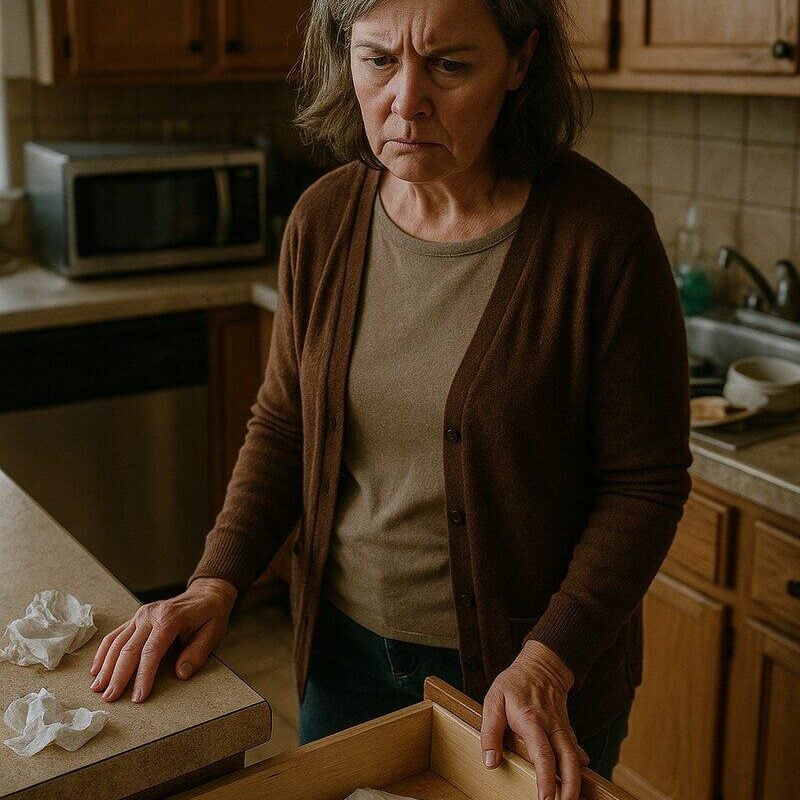
Rage Bubbles to the Surface
That resolve moved through me like a wrung-out dish towel snapping. My hands were shaking, my jaw clenched so tight it ached. I marched from the kitchen, heart pounding in my ears, pausing only to grab my house rules—the ones I’d printed, revised, and reposted so many times they’d started to curl at the edges. No more trembling reminders, no more tiptoeing around sighs or sideways glances. In my own house, I deserved more than this. I stormed down the hallway, shoes squelching on weeks’ worth of grime, past scattered piles of dirty laundry and abandoned toys. A sharp, unfamiliar voice—my own, it turned out—echoed inside my head: Enough. I was finally ready to make them listen, and I didn’t care if it made me the “crazy aunt” or the “strict old lady.” Respect was not optional in my home. Not anymore.
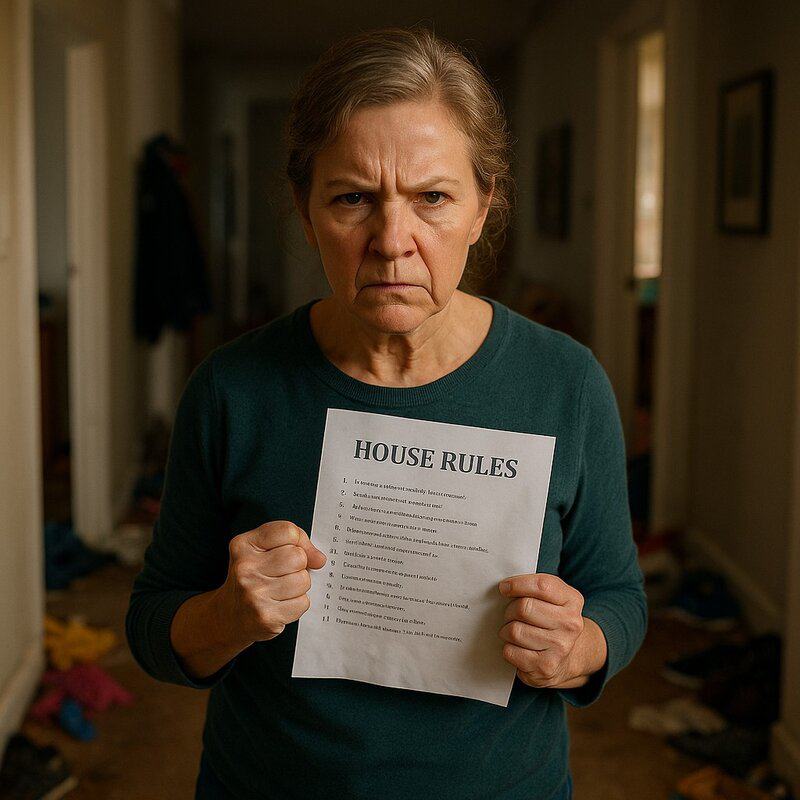
I Snap—No More Mrs. Nice Host
Without pausing to brush the syrup from my sleeve, I threw open the living room door. The TV blasted reality shows, the kids sprawled on the couch, empty chip bags rustling at their feet. My sister lounged by the window, scrolling her phone. They all looked up as I swept in, the house rules trembling in my fist. I didn’t yell—my voice was low and tight, every word deliberate. “I am finished,” I said, unwavering. “This is MY house, and these are MY rules. If you can’t respect them, you will need to leave.” The air thickened with shock. I could feel every eye on me, the silence stretching, broken only by a single chip bag crackling as it was hastily set aside. For the first time in months, I didn’t feel like a guest in my own home. I felt like the owner. And I was ready to fight for the peace I had lost.
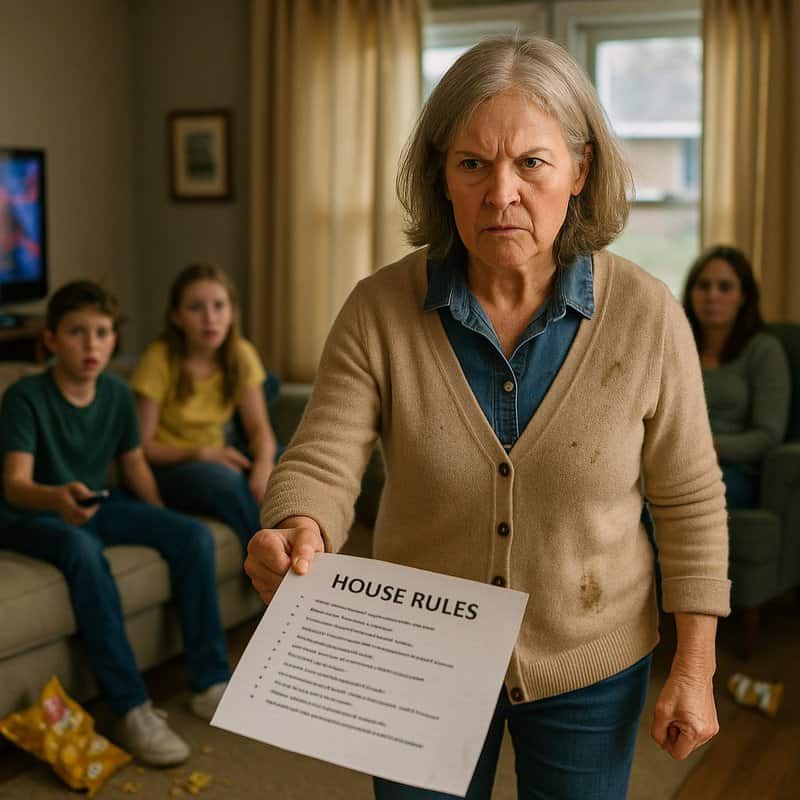
Storming into the Living Room
The silence in the living room was suffocating. All conversation stopped, the kids frozen mid-bite, my sister’s expression flickering from confusion to outrage to, finally, uneasy recognition. I stood tall in the doorway, the list of house rules trembling in my hands—a physical reminder that I’d tried kindness, compromise, silence, and patience. None of it had worked, and now I was pulled taut with determination. My eyes met my sister’s across the couch. “I can’t go on like this,” I said, the words steadier than I felt. “I miss my own life. I don’t recognize my home anymore.” I addressed the kids—my own relatives, who suddenly looked so small on that giant, crumby sectional. “You may not care about these rules, but you WILL respect them. And if you can’t, then this isn’t the place for you.” Not a voice raised, not a foot shuffled—the weight of my anger and sorrow pinned everyone in place. At that moment, I realized: my family was finally hearing me, loud and clear.
My Rules, Loud and Clear
I took a breath, the air burning in my chest, and read the rules aloud, each one ringing through the room like a challenge. No eating in the bedrooms. No shoes on the furniture. Everyone cleans up after themselves. Quiet after ten. If you can’t honor these—my voice didn’t waver—then you’ll need to find somewhere else. There was no negotiation in my tone, no apology buried in the litany, and for once, nobody tried to interrupt or talk over me. Even my sister, who had always brushed me off with hugs and smiles, sat frozen, her phone slack in her hand. The kids gawked, incredulous. My hands stopped shaking for the first time in ages. I set the rules down on the coffee table, stared each person in the eye, and finished with a voice as steady as
Family’s Shocked Silence
You could have heard a pin drop—a rare thing in my own living room, where for months all I’d heard was the cacophony of other people’s lives. My sister’s face cycled through a dozen emotions, each one more unsettled than the last: first indignant, then wounded, then—somewhere in the depths—guilty. The kids stared at me with wide eyes, silent for once, their hands hovering over half-eaten crackers and soda cans. My words hovered in the air, dense and final. I saw the wheels turning as they realized this wasn’t one of my gentle reminders or exasperated sighs—it was a reckoning. Even the television, still blaring some garish reality show, seemed to fade into the background. I watched as my niece slid slightly closer to her brother—suddenly unsure, suddenly small. For the first time since they’d moved in, the power in the room shifted. I was no longer the background; I was the headline act. And they didn’t quite know how to respond.
Sister Tries to Laugh It Off
My sister, never one to own up to discomfort, was the first to break the silence. She let out a forced little chuckle, as if I’d just delivered the punchline to a slightly risqué joke. “Come on, Mandy,” she said, using that childhood nickname she knew I hated. “It’s not such a big deal. We’ll clean up, promise! The kids are just… being kids. Don’t let it stress you so much.” She kept her tone light, her grin just a little too wide, hoping to charm away the tension the way she always had. But I didn’t budge. I kept my gaze steady, arms crossed, rules vindicated by every crumb and sticky patch I’d spent my morning scrubbing. I watched her face as she realized I wasn’t going to be placated by a joke or a hug this time. Something cold and uncertain flickered in her eyes. I didn’t smile back. “No more promises, Jen. This is happening,” I said, and her laughter died in her throat.
I Stand My Ground
Normally, this is where I’d give in—a shaky smile, a hasty retreat to my bedroom while muttering about ‘picking my battles.’ But I planted my feet instead, the list of rules like an anchor in my hand. “I’m serious,” I said, my voice unwavering. “I can’t live like this. This is my house and my life, and I’m not going to apologize for wanting respect under my own roof. If things don’t change today, you’ll all have to find somewhere else to stay.” It was the first time I’d ever given her an ultimatum, the first time I spoke without leaving a crack open for negotiation. I saw my sister’s face blanch, her bravado melting. The kids muttered, sullen and unsure. But I didn’t waver. I was done being the pushover, the easy-going aunt, the shadow in my own story. The lines were drawn as clearly as the coffee ring on the table: this was no longer a suggestion—it was a boundary, and I wasn’t crossing it for anyone.
Nieces and Nephews Protest Loudly
That’s when the kids erupted, as I’d always feared—shouts rising in a messy chorus. “That’s not fair!” my nephew whined, his voice sharp with teenage outrage. My youngest niece burst into tears, wailing something about how “Aunt Amanda is mean,” as if months of ruined sleep and lost peace were nothing compared to a single, shocking no. The oldest tried to argue, indignant: “We have nowhere to go! Mom said it was fine!” The chaos echoed off the walls, little hands pounding couch cushions, feet stamping on my freshly cleaned floors. For a sliver of a second, I almost faltered—old guilt rising up like a tide. But I took a breath, remembering the chipped mug, the sticky floors, every indignity swallowed in the name of family. “Enough,” I said, my tone slicing through the racket like a bell. “You need to listen, not fight.” I was their aunt, yes—but I was also the woman who’d built this home with her own hands. And I would not be shouted down in my own living room.
Pack Your Bags: The Ultimatum
My sister’s composure was unraveling, but I didn’t flinch. “I mean it. You all need to pack your things. You’ve got two days to make alternate plans.” My words landed like stones in a pond—echoes spreading through the stunned silence that followed the kids’ protests. My sister gaped at me, finally understanding that this was no bluff; there would be no gentle backtrack, no late-night apologies. I saw the anger flicker, then the calculation—her mind running through options and coming up empty. The kids looked to her, desperate for a lifeline, but none was coming. For once, the power in the room was balanced in my favor. I didn’t shout, didn’t wave my fists. I simply stood there, tired but resolute, holding the reins of my own life. “This is my home,” I repeated softly. “You are my family. But I am not your doormat.” With that, I walked out of the room, the click of my slippers down the hall a quiet, steady drumbeat, equal parts fear and relief thrumming in my chest.
“But Where Will We Go?”
Behind me, voices rose in a new wave of panic. My sister trailed me into the hallway, her voice thick with disbelief and genuine fear. “Amanda, please—we have nowhere else. What do you expect me to do? You know money’s tight, the kids have school, and—” She tripped over her own excuses, desperation chipping away at her pride. In the living room, my nieces and nephew started bickering, blaming each other for the mess, the rules, the impending crisis. The guilt rose again, insistent as a headache. But I steeled myself. “You’re their mother,” I said quietly, not unkindly. “It’s your turn to figure this out, not mine.” For too long, I’d shouldered problems that weren’t mine to solve. Now, for the sake of my own peace, I had to set the burden down. It hurt—of course it did. But it was the truth.
Emotional Blackmail Begins
My sister’s tears came next—big, theatrical, designed to disarm the most steadfast of hearts. “How could you do this to family?” she sobbed, clutching at my sleeve. “Ron would be ashamed of you!” (That was the lowest blow, and we both knew it—invoking the one person who’d always served as our family’s gentle anchor.) “We’re all each other has,” she pleaded, her voice ragged. The kids joined in, sniffling, working their own angle: “I thought you loved us, Aunt Amanda.” Their words stabbed at me, reopening wounds from other battles lost in childhood, from decades of being the ‘nice one,’ never demanding, always forgiving. But I saw the emotional power play for what it was—a desperate attempt to stay comfortable at my expense. “I do love you,” I said, my jaw clenched. “Enough to insist on respect. And enough to know that I deserve it too.” I let my sister’s hands fall away. There would be no compromise this time.
Reluctant Packing, Angry Glares
The next few hours were a blur of angry noises and slammed doors. My sister dragged out suitcases from the hall closet, muttering under her breath, while her kids sulked and shoved their belongings into trash bags and backpacks, bickering over who’d take what. Every so often someone would shoot me a glare—my nephew glowering with watery eyes; my niece slamming her bedroom door so hard the picture frames rattled. The kitchen was a battleground, the laundry room a war zone, as possessions were sorted and accusations hurled. No one thanked me. No one apologized. Not yet. But beneath the bitterness, I sensed a thin current of shame—maybe even acceptance—that things couldn’t go on as they were. I kept my distance, busying myself with small tasks, reclaiming little corners of my home as they began to disappear from it. Each packed bag felt like proof: I could stick to my word.
Phone Calls to Extended Family
Soon, the phone was ringing off the hook as my sister called anyone who might offer a lifeline—our cousins in the next town, old friends, former neighbors. Each conversation echoed down the hallway: frantic, pleading, half-whispered. “It’s just for a little while—we’re having a misunderstanding,” I heard her say, glossing over the heart of it all. Sometimes I caught snippets of anger: “She’s being impossible,” or the inevitable, “She doesn’t understand what family means.” I didn’t rush in to defend myself—if anything, the distance gave me space to clear my own mind, to let the dust settle before the door finally closed behind them. The web of our extended family shivered, realigned, with some offering gentle sympathy to both sides, others keeping out of it entirely. Through it all, I remained steady—no longer offering shelter at the cost of myself.
Rumors and Stories Spread
With every hour, the story grew in the retelling—at least, that’s what my phone suggested as texts and calls started filtering in from across the family tree. Some called, voices low, to ask what really happened, confused by the dramatic stories spinning from my sister’s corner51. Unexpected Backup: A Supportive Friend
Just when I thought I was standing alone in this standoff, the doorbell rang. I opened it to find my friend Eileen, the kind of neighbor who always seemed to know when a crisis was brewing before I even picked up the phone. She took one look at my face—and the absolute chaos visible through the hallway—and didn’t hesitate for a second. “Do you need backup?” she whispered, so only I could hear. All I could do was nod, grateful tears prickling at my eyes. Eileen stepped inside, surveying the scene with the critical eye of a kindergarten teacher on the warpath. She greeted my sister and the kids politely, but she made it abundantly clear by her posture alone that she was on my side. “Looks like it’s time we put some grown-up boundaries in place,” she announced, voice cheerful but unyielding. With Eileen beside me, the loneliness of standing up for my space began to ebb, replaced by a surge of strength I hadn’t felt in months. Even my sister blinked, recognizing this united front for what it was—a clear line drawn, no more room for negotiation.
Turning Down the Emotional Volume
Things changed with Eileen in the house. Suddenly, my sister’s tone shifted. The teary guilt trips and flimsy apologies that used to bulldoze right over me didn’t have the same power when another adult stood by my side, arms crossed, eyebrows raised at any attempt at manipulation or melodrama. When my sister started to protest—raising her voice about “nowhere else to go” or “the kids are just being kids”—Eileen quietly stepped in: “Amanda invited you out of kindness. Kindness doesn’t mean you get to take over her home.” The energy in the room changed from chaos to a wary truce. My nieces and nephews retreated from their muttering and dramatic sighs, glancing at Eileen as if she might actually assign them chores right then and there. Even I was surprised by how calm my voice sounded as I reiterated the new expectations, no longer apologizing for needing peace. The volume of drama, for once, was finally manageable.
Standing Firm Through Tears
It didn’t take long for the storm of emotions to roll in—my sister teetering on the edge of tears, the kids put out and grumbling and throwing resentful looks my way. There was a moment, as she dabbed at her eyes and whispered, “But you said we could stay as long as we needed,” when guilt crept up the back of my neck, threatening to unravel my resolve. I glanced at Eileen, and she squeezed my hand under the table, a silent reminder that my feelings—the exhaustion, the feeling of loss, the need for space—were valid. “I said you could stay until you found something else,” I corrected gently, but firmly. “I never said you could stay indefinitely, or treat my house like it doesn’t matter.” The tears came then, but I was braced for them; I had finally built my own emotional armor. Through choked apologies and muffled sobs, I did not back down. I had drawn a boundary, and this time, I was holding it—tears or no tears.
Last-Minute Bargaining
As the reality set in, my family clung to hope with last-ditch deals and compromise attempts. “What if just the kids stay?” “Can we pay you more—next month, when things get better?” My sister threw every excuse, every plea she could think of at me, her voice twisting in desperation. But I’d heard them all before, every version of “just a little longer” that had led me to this point of exhaustion. I shook my head, gentle but unwavering. “I need my home back,” I repeated, like a mantra. The kids’ protests faded, replaced by the frantic zipping of duffel bags and the thudding of feet up and down the stairs. Each plea felt like a test, and each time I said “no,” I felt myself growing a little freer. For the first time, I wasn’t letting emotional blackmail sway me. I was setting new terms—and it was up to them to accept or move on.
The Final Goodbye—Or So I Think
Within a few hours, the house transformed from battleground to the uneasy quiet that follows a long storm. Suitcases trailed in a mournful procession down my hallway. My sister paused at the door, still tearful, promising to send for the last of their things “soon.” There were more apologies—some genuine, some routine. My eldest niece wouldn’t meet my eyes, and the youngest muttered about “mean old people.” But I simply opened the door with a steady hand and repeated my farewell. It wasn’t triumphant—I was bone tired, emotionally wrung out—but it was necessary. As the last car door slammed and taillights flickered off down the street, I leaned back against the door, closing my eyes and filling my lungs with the rare, beautiful quiet of an empty house. For the first time in ages, I didn’t wonder if I’d done the right thing. I knew I had.
Closing the Door on Chaos
I stood behind my closed front door, listening to the echo of silence before I dared to move. My hands still shook, the air humming with the residue of so much drama and hurt. It took a minute to realize what I was feeling—relief, nearly as sharp as heartbreak. I checked the living room: abandoned shoes, a lone sock, a half-empty juice box. The silence felt almost alien. I wandered from room to room, straightening cushions and collecting the flotsam of their departure—detritus from a siege finally ended. Eileen brought me a cup of tea and sat with me at the kitchen table, both of us listening to the hum of the refrigerator and the comforting tick of the old wall clock. “It’s your house again,” she said quietly. “You did it.” I felt something shift in my chest—sadness for the mess of it, but overwhelming gratitude for the restored peace. I closed my eyes, savoring the sound of nothing, and felt a promise rising: I would never let chaos rule my home again.
Silence Fills the House Again
Later, when Eileen left and dusk gathered outside the kitchen windows, I stood in the hallway and just listened: no footsteps pounding overhead, no cries for snacks, no TV blasting upstairs. The silence was deep, almost oceanic. I could hear the faint hum of the heater switching on, the far-off chirp of the evening’s first crickets. At first, the quiet rang almost too loud—memories of Ron, and of all the years I’d guarded these rooms, pressed in close. But then I realized there was no longer anything to dread as I rounded each corner; no mess I didn’t make, no tension waiting behind the next closed door. This was my space, reclaimed. In the peace, I finally exhaled—long and slow—and felt the ache in my shoulders begin, at last, to unwind.
Room by Room: Reclaiming My Space
That night and over the following days, I moved through my house with new purpose. I opened windows to let out the stale air and let in the fresh, spring-sweet breeze. In the bedrooms, I found lost socks, candy wrappers, and forgotten homework—signs of hasty departures—but also the presence of space that was mine again. In each room, I restored order lovingly, not just as a chore but as an act of reclamation. I set a new vase of daffodils on the dining table; I carefully washed each dish in the good china set. In my own bedroom, I changed the sheets and finally slept with the door open, knowing there would be no midnight disturbances. Every lamp, every throw pillow returned to its place. I moved slowly but steadily, reclaiming not just physical rooms, but the spirit of a home that had long waited for me to return.
Deep Clean, Fresh Start
I spent the better part of a weekend deep cleaning—scrubbing baseboards, running the vacuum stubbornly into every corner, shaking out rugs that hadn’t seen daylight in months. Each bucket of sudsy water felt like it was washing away months of exhaustion and frustration. I wiped the sticky residue from the fridge, took out every single trash bag, and set Ron’s mug—the mug that started it all—back on its special hook, cleaned and unchipped. There was a fierce satisfaction in each sweep and scrub. I played my favorite records, humming along as I dusted picture frames and polished the family photos on the mantel. For the first time in a long time, I didn’t resent the work. This was my fresh start, my chance to set the tone for a peaceful, intentional life in the home that meant so much to me.
Restocking My Fridge
A few days later, armed with a shopping list and more optimism than I’d felt in ages, I wandered leisurely through the grocery store aisles. No one to demand sugary cereal or “just this once” instant noodles—just me and the recipes Ron and I once cherished. I filled my cart with things that brought me joy: good coffee beans, fat red apples, sourdough bread, my favorite sharp cheddar. At home, I wiped the shelves clean and organized everything just the way I liked, lining up jars and stacking produce with an almost ceremonial pride. I brewed a cup of coffee and drank it slowly—out of my favorite mug this time, undisturbed—standing in the quiet of my newly reclaimed kitchen. The comfort was profound. For the first time in months, my home felt safe, sustaining, and truly mine again.
Breathing Easy at Last
It was as though I’d forgotten what it meant to relax inside my own skin. The very air seemed lighter now, each breath uncoiling another layer of tension in my chest. I wandered through my living room barefoot, relishing the soft give of the rug under my toes—no Legos hidden to jab me, no piles of shoes to step around. I could light a candle and read a chapter from my book without someone switching the TV to cartoons or hollering for snacks from the hallway. There was a gentle stillness in every corner, a sense that the house itself was breathing easy with me. I realized how desperately I’d missed this—the simple, quiet freedom to exist exactly as I pleased, no explanation needed. I slept the whole night through for the first time in months, and when I woke, sun pooled across the bed and not a single voice called my name. For once, I knew deep in my bones: peace had returned, and this calm belonged to me.
A Peaceful Night’s Sleep
That night, I turned in early, the house humming with nothing but the ordinary sounds of home: the faint ticking of the clock, the creak of old hardwood, the reassuring groan of pipes as the heater cycled. I pulled the covers up and hugged Ron’s old pillow—the one time and laundry never quite faded to blandness—and let my eyes drift closed with no anxiety for what the next morning might bring. No quick calculations of milk left for breakfast, no worry that someone would be in the shower at dawn or leave wet towels bunched on the tiles. Just darkness, gentle, and unbroken. I slept deeply, the kind of sleep that knits you whole again, and woke to sunlight spilling across the quilt, the house still and waiting, as if it too savored the quiet after so many months of relentless motion. It was just me, my thoughts, and the song of birds through the open window. My heart felt steady, my body rested. Home, finally, was a refuge once more.
Rediscovering Old Routines
With the chaos behind me, old habits bubbled to the surface like muscle memory. I found myself humming as I tidied up after breakfast—just one mug in the sink, mine, not a precarious tower of dishes crusted over from a dozen competing cravings. I opened my curtains each morning to let the light stream in, watered my plants, and took time sorting the mail at the kitchen counter—no more piles left ignored for weeks because someone swiped all the best spots. I listened to the radio as I went about my morning, brewing my coffee strong and black, exactly the way I liked without accommodating anyone else’s taste. Even the process of making toast—and knowing it would stay right there on the plate, warm, until I chose to eat it—felt like an unexpected luxury. I lit a stick of lavender incense in the evening and curled into my armchair with a favorite blanket and an old movie. These routines were anchors in the calm, steadying me as I reclaimed not just my house, but the gentle rhythm of a life that was truly my own.
Loved Ones, Real Apologies
Reclaiming my space didn’t mean closing my heart forever. Slowly, over the next week, my phone lit up with messages from family—apologies that felt honest, not just strategic. My middle nephew sent a text, sheepish and sweet, admitting that “It was kinda rude, sorry for being messy, Aunt Amanda.” Even my sister, in between updates from the new apartment she’d found, sent a long email—her words different this time, less blaming, more understanding. “I didn’t realize what we were asking of you,” she wrote. “I thought you were just being fussy about the rules. I see it differently now. I’m sorry.” The olive branches were small, but sincere. We made plans for coffee—at a café, not my house—for a proper talk. There was a feeling of wounds beginning to heal, cautious but hopeful. The boundaries I’d set had not driven us apart for good; instead, they laid the foundation of new respect between us, sturdy and sure. For the first time in ages, I felt a small spark of genuine hope for the shape of our family’s future.
Sister’s Regretful Texts
I wasn’t quite ready for the first message my sister sent after the dust settled. It came late, filled with hesitations and fragments: “I know I pushed you too far. The kids miss you. I wish I’d paid attention sooner—I got selfish, and I’m sorry.” I reread her words, half-expecting the old barbs or bargaining, but none came. Just regret, and a quiet plea for forgiveness—not, this time, for another favor or extension of hospitality, but simply for understanding. It was awkward, but relief flickered between the lines. We exchanged a few tentative texts, keeping things light: memories about Ron, gossip about neighbors, even a funny anecdote about her new landlord. Slowly, I felt us inching back into a kinder rhythm. We weren’t ready yet for a Sunday roast together, but I no longer braced for an argument every time her name appeared on my phone. It felt like progress—earned, honest, and just enough for now.
Family Discussions About Boundaries
Once the initial storm passed and raw nerves mended into tender scars, real conversation finally grew possible. My sister called, not to plead but to genuinely talk, her voice quieter than I remembered. “We need to get better at boundaries,” she said plainly. We talked about everything: how quickly good intentions can become entitlement, how kindness needs limits to stay genuine, how silence in the face of small annoyances grows into anger that feels impossible to contain. For the first time, everyone listened. Even the kids chimed in, recalling the rules they’d ignored, the messes they’d left—in their own sheepish, mumbling way. Together, we drafted the kind of agreement that should have existed from the start: clear terms for visits, defined lengths of stay, promises to respect one another’s peace. It was awkward, sometimes painful, but healing, too. I hung up the phone feeling lighter, even proud. We’d done the messy work of learning from our mistakes, and traded anger for the clarity of real understanding.
Setting New House Rules
The next family birthday passed, and for the first time since the ordeal, I volunteered to host—briefly, and with boundaries clearly spelled out ahead of time. No overnight bags. No shoes on the couch. Clean up what you use, respect my schedule, and above all: my house, my rules. There were a few nervous glances and one polite complaint about my “old-fashioned” preferences, but everyone complied. The difference was evident immediately. The party ended at six sharp; by six-thirty, the kitchen was spotless, the living room still orderly, laughter lingering rather than tension. When the last guest hugged me goodbye, I locked the door without dread, knowing I’d preserved both my peace and my relationships. I’d learned: boundaries weren’t about shutting people out, but making room for mutual respect inside my home. The rules held, and so did my sense of self.
Learning to Say “No”
Perhaps the biggest change wasn’t in the house itself, but in me. A neighbor asked if her grandkids could sleep over, and without guilt or long explanations, I smiled and shook my head. “Not this time. I’m enjoying the quiet for a while.” No nerves, no second-guessing. It was liberating, drawing the line before resentment could find its way back in. Setting boundaries—firm, gentle, and unapologetic—became not just an act of self-preservation, but a quiet celebration of all the years I’d put in, making this place my own. Each time I said no to a request that would have overwhelmed me, I said yes to myself—to peace, to rest, to the life Ron and I dreamed of for this house. And each no felt easier, a muscle strengthened, a victory solidified.
Becoming the Author of My Peace
With the crisis behind me, I realized I had the right—and the responsibility—to write the terms of my own sanctuary. That meant choosing when to open my door, and when to close it with a gentle but resolute click. My space was no longer a free-for-all, defined by the needs or wants of others. I crafted new routines and made deliberate decisions about how I wanted my home to feel: quiet when I craved solitude, alive with company by invitation, and always safe. Sometimes I still felt echoes of guilt when I enforced my new boundaries, but more often, I felt powerful. I was the architect of my comfort, the defender of my peace. No one else—not family, not friends, not well-meaning neighbors—got to take that away from me again.
Morning Coffee, Quiet and Free
The first truly quiet morning filled my house like blessing. I woke up without an alarm—no shouts from the hallway, no door slamming, no clatter of stolen cereal in the kitchen. The sun filtered in through the kitchen window while I brewed my coffee in the silence. I took my favorite cobalt blue mug—the one Ron had bought me at a street fair, the one missing for weeks and now gloriously returned to its shelf. I walked out to the back step, felt the cool air on my face, and sipped slowly. No one needed anything. No one interrupted. The quiet was honey-sweet, settling something deep in my chest. I watched the neighborhood wake up, birds dart in and out of the hedges, and felt the profound rightness of solitude. My morning routines were my own again, filled with small pleasures—crossword puzzles, the scent of clean linen, long phone calls with old friends. This was what I’d fought for. This was what I’d reclaimed.
Looking Back Without Regret
Sometimes, in the evenings, I’d find myself replaying the worst moments: the shouting, the guilt, the heartbreak of having to push my own family out. But the regret never lasted. I reminded myself of the alternative—months more of living like a stranger in my own life, letting resentment eat away at love. Instead, I’d taken control, asserted what I needed, saved the relationship by saving myself first. My home was proof that you could draw lines in the sand, even against a tide of expectations, and not be washed away by them. I’d chosen a harder path, maybe, but the right one. I could look back at every step—every no, every boundary, every tearful conversation—and feel proud, not ashamed. The cost had been high, but the return—this solid, steady peace—was worth every moment.
From Doormat to Door Keeper
If there’s anything I’ve learned—and would tell anyone who found themselves in shoes like mine—it’s this: kindness is not the same as surrender, and your home is not a sacrifice zone for everyone else’s comfort. I learned to be the keeper of my own peace, to stand between my sanctuary and the chaos others might bring. It wasn’t easy, trading “yes” for “this doesn’t work for me,” but it was a kind of courage no one prepares you for. Now, my door opens when I choose, and closes without apology. I don’t host out of obligation, or let guilt take the wheel. I think Ron would have admired how fiercely I’ve learned to protect what matters. I never lost my generosity—but I finally learned to guard it, and to value myself in the process.
When Home Feels Like Home Again
Weeks have passed, and every day the house feels a shade more like it did in the early years: a place for laughter by invitation, for quiet by design, for living on my own terms. I bake bread on Sundays and the warm scent fills every room, undiluted by cologne or too-loud music or the rubbery tang of microwaved snacks. When friends come over, we laugh and reminisce, and at the end of the night, the peace remains when the door closes behind them. Plants have returned to the windowsill; the coffee table is uncluttered. My sanctuary is mine, and the world outside feels distant, even in memory. Home, finally, is a word that only means comfort now—not exhaustion, not loss.
Advice for Future Houseguests
If future guests cross my threshold, they’ll do so understanding my rules before they unpack a single bag. I know now to lay out boundaries in bright, bold letters, not the shrinking fine print of old guilt. Short stays, clear expectations—and if anything feels off, I’ll speak up, early and often. I’d encourage anyone—especially the “nice ones” in the family—to practice the script of self-respect early, before resentment can grow like mold on a forgotten loaf of bread. Polite honesty is the only way forward. Hospitality is a gift, not a duty; your home is for you first, and guests—family or not—must honor that above all.
Grateful for Solitude, Stronger Than Before
Now, when the sun rises and fills the house with gold, I feel more myself—and more grateful—than I have in years. I know now that solitude is not an emptiness, but a fullness: the luxury of being alone in a space made entirely your own. I treasure the strength I found in protecting my boundaries, in clawing back the right to peace, respect, and joy in every corner of my home. I’m not afraid of being called “mean” or “too strict”—those labels mean nothing compared to the way I breathe easy each morning, and fall asleep each night with my soul at rest. There’s power in quiet, in choosing yourself, in refusing to be trampled by the demands of others. It isn’t selfishness; it’s survival—and at last, I understand that I was always worth the trouble.
